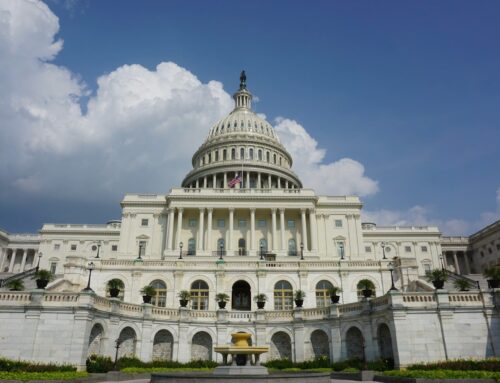We hope this week’s Wastebasket finds you healthy and doing as well as possible in the very difficult crisis facing our nation and the world.
Taxpayers for Common Sense staff is practicing physical distancing, teleworking, and meeting virtually to keep the oversight trains running. To that end, we are still tracking legislation and following the money. This isn’t our first big emergency spending package rodeo. While this may dwarf other packages like TARP, the 2009 stimulus and disaster spending bills, the underlying principles remain the same. We have drafted those principles that should guide any Covid-19 response and economic stimulus emergency spending package and we made sure that all policymakers knew where we stand. In short they are:
- Do what’s necessary, not advantageous
- Deficits still matter in the long run
- Prioritize response on mechanisms with the greatest positive effects
- Emergency legislation should not make permanent changes, or create long-term liabilities
- Transparency and accountability are key
Individuals and businesses across the economy are hurting. And they’re letting policymakers know. Businesses and associations from aerospace to ethanol are submitting requests to Congress. There have been a couple smaller packages, but the most recent one – released by Senate Republicans – is in the trillion-dollar vicinity. While much of the attention has gone to the checks that some Americans are going to receive there has been less attention to loan programs for the airline industry, small business loans, and regulatory assistance like suspending student loan payments. And it’s pretty clear that this package is merely the opening salvo.
We’ve started tracking all the industry requests far and wide. We recognize that we’re going to need an economy after the country gets through this (and we will) but we have to be smart in how the nation allocates resources and how it goes about its business.
So for instance, when the Aerospace Industries Association asks to have their workers deemed essential, we are left scratching our heads wondering if they are putting profits ahead of the well-being of their employees and communities. We’ve got our problems with the F-35, but putting that aside, we don’t need workers building more of them right now when they should be doing what other Americans are, physically distancing. And we point out that the most closely analogous civilian manufacturing sector, the auto makers, have closed down production lines. That’s the responsible approach, and it keeps your highly trained workforce healthy and ready to return to their jobs when the crisis eases.
Another request from AIA is for “clear and consistent guidance for all federal contracts.” That seems reasonable on its face, until you get to the detailed requests for accelerated payments, obligations and contract awards. That, right there, is a recipe for decreased oversight. And THAT is the last thing any taxpayer should want when hundreds of billions of dollars are about to slosh through the economy. Repeat after us: Oversight matters.
We’re in uncharted waters. A health and economic challenge like the one before us is daunting. Absolutely, we as a nation must think big. But while you would “throw everything you’ve got” into stopping a fire from ravaging your house, you shouldn’t take that literally. Throwing the container of gasoline from your garage or that pile of old paper tax filings wouldn’t help. So, too, policymakers should be deliberate in their choosing what policy tools to throw at this health and economic fire.
It’s encouraging, thus far, that lawmakers are thinking big but not going overboard. Under the Senate bill airlines won’t pay excise taxes, which cover the cost of improving airports, the rest of the year. They will not, however, get previously paid taxes refunded AND have the suspension done through all of 2021 AND have the suspension extended indefinitely until some unarticulated improvement in the economy.
Ditto with the various industry-specific programs to cover losses. Hundreds of billions are going to be made available for businesses that have lost revenue. But we don’t have a “Confectionary Industry Recovery Fund” with $500 million set aside only for candy makers – which they asked for. Or a $250 billion “Travel Workforce Stabilization Fund” set aside for people in the travel and hotel industries – also requested. Improving and expanding on existing programs is likely a more efficient way of delivering support. So expanding things like Small Business Administration loans, Unemployment Insurance, nutrition programs, and Federal Reserve lending should all be in the mix. Creating dozens of new narrow industry-specific programs is fraught with danger.
We’re all going to be at this a while. So please keep yourself and your community safe. We’ll do the same and keep watching your tax dollars.











Get Social